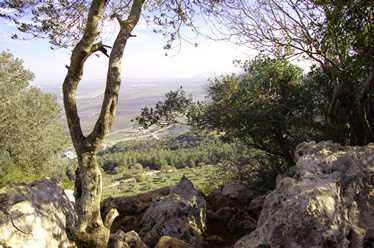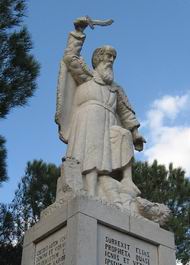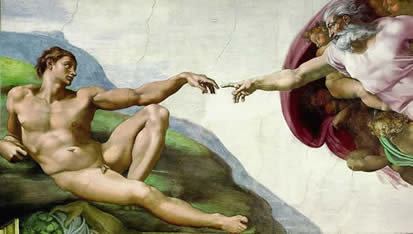


Chapter VI
A Plan Moves Forward
No man, having put his hand to the plow,
and looking back, is fit for the kingdom of God.
Luke 9:62
The book of First Kings chronicles an event in which the great prophet Elijah confounded the priests of Baal on Mt. Carmel. At that time, God used him to indict Israel because it had compromised the true faith and embraced a pagan religion. It is little wonder such a thing happened in light of the fact that Israel, at that time, had what may very well have been its most wicked king.
King Ahab reigned for twenty-two years and was everything a leader shouldn’t be. Add to that, his wife Jezebel was even more despicable than he was. Jezebel was a devout worshiper of Baal and even commissioned a temple to be built in this pagan god’s honor. She was a cold blooded and vicious queen and was ruthless in persecuting God’s true servants – even resorting to murder (1Ki. 18:4).
However, the time had now come when God would use Elijah to offer a challenge to the pagan religious leaders who had infested Israel. This challenge was in the form of a great test to see who the true God was. The challenge was quite simple. Two altars would be built: one for Baal, and one for the God of Abraham, Isaac, and Jacob. A sacrifice would be placed on each of the altars. The prophets of Baal would then be given an opportunity to appeal to their god to consume the sacrifice they had presented. Once they were finished, Elijah would appeal to his God to consume the offering he had brought.
This contest was even structured to heavily favor the priests of Baal. For example, the servants representing this false god numbered in the hundreds, while Elijah stood alone as God’s representative. Add to that the fact that Elijah would saturate the altar he had built with water, making it all but impossible to ignite. When this challenge was initially extended, the priests of Baal must have felt very confident.

A view of the Jezreel Valley as
seen from Mt Carmel
The story of Elijah’s victory on Mount Carmel is famous in scripture. A false god and its worthless religion was exposed as impotent and feeble, while the true God was revealed as a great and powerful Being who would make Himself known through His servants. As far as Elijah was concerned, this challenge would put to rest, once and for all, any doubts about who the true God was – or so Elijah thought.
Elijah’s Discouragement
At the conclusion of this challenge, Elijah and his God stood victorious. When the people who had witnessed this event saw what occurred, they prostrated themselves and cried out, “The Lord, He is God; the Lord, He is God!” Elijah then executed the priests of Baal, and in doing so placed an exclamation mark on this moment. In a very real sense, Elijah’s actions demonstrated how God will ultimately deal with false religions and their leaders (Rev. 19:20).

Elijah the Prophet
This statue was erected on the grounds of the Mukhraka Church located on
the hillside of Mt. Carmel. It was once destroyed by Muslim armies during
Israel's war of independence in 1948, however, it was subsequently replaced.
The scriptures suggest that even King Ahab was impressed with what God had done through His prophet. However, when news of what happened got back to Jezebel, she was furious. Furthermore, this bitter woman vowed that her fury was going to be appeased with the blood of Elijah – and she promised to make quick work of this vow. Jezebel immediately issued a death warrant on God’s prophet and even sent him a copy. Notice the message she dispatches to Elijah – a message that makes specific reference to the pagan priests he had just killed.
Then Jezebel sent a message unto Elijah, saying, So let the gods do to me, and more also, if I make not your life as the life of one of them [the priests he killed] by tomorrow about this time. (1Ki. 19:2)
Upon receiving this news, Elijah fled to Judah. While there, he expressed great discouragement over what had transpired and even appealed to God to take his life (1Ki. 19:4). At this point, Elijah simply wanted to give up.
Wanting to Quit
Virtually every true believer has, at one time or another, been beset by trials that seemed too great to bear. Even the apostles fled when Jesus was arrested in the garden of Gethsemanae and led away to His death (Mk.14:50). Afterward, they actually pondered the idea of returning to their regular lives and giving up on the work they had been given to do (Jn. 21:3).
However, unlike man, God does not have the luxury, nor the inclination, to ever give up. Oh, to be sure, He has experienced disappointments and has also taken radical steps to deal with evil. But God is steadfast and determined to accomplish what He desires, and no power in the universe can thwart what He intends to do (Isa. 46:9-10). Never was this truth more apparent than when He renewed the face of the earth, and once again prepared it for man.
A Work Continues
The Bible reveals that some time after God created the universe, the earth became chaotic and confused (Gen. 1:2). In the prior chapter, we saw that this chaos was the work of the great archangel Lucifer who had now become Satan the devil. Satan orchestrated this chaos in an attempt to thwart God’s Plan for man. We also learned that God turned back this rbellion, but not before the heavens and the earth lay in ruins.
At this point, God surveyed all that He had made and considered His next move. The Great Creator and Sustainer of the universe knew all too well that in order for His Plan for mankind to go forward, He would have to refashion the earth and prepare it for His future Family – and that is exactly what He set out to do. The Bible reveals that God actually reconstructed the heavens and the earth. By doing so, man would once again have a home in which to learn and grow.
Six Miraculous Days
The scriptures reveal that God used six days to reconstruct the physical domain that would serve as man’s home. The Great Creator would begin by commanding the presence of light in what was at that time a universe of darkness (Gen. 1:3). At this moment, the force of God’s great power and will echoed through space, and light appeared. God then separated the light from the darkness, bringing to a close the first day of re-creation.
For the next five days, God would painstakingly direct a remarkable work. During this period, He would create an atmosphere, form bodies of water, build mountains, and fill the earth with vegetation. He would also design living creatures to fill the seas and animals to roam the earth.
The Bible reveals that when God prepared the earth for man, He was providing more than the basic necessities. The earth would be a beautiful place, with wonders that would inspire all who dwelt there. It would be a place of endless discoveries and great treasures. Here, man could work as well as play. He could learn as well as teach. He could feel as well as touch. In this environment, man could discover profound truths about his Creator and the wonderful Plan that Creator has for him.
The great wisdom and mercy God employed when rebuilding the heavens and the earth is powerfully captured in an exquisite psalm dedicated to this very act. The 104th Psalm was written by King David of Israel and is a tribute to God’s majesty and greatness. It describes both His creative power and His capacity to sustain what He has made. Notice the exquisite words that introduce the God who created heaven and earth.
Bless the Lord, O my soul. O Lord my God, You are very great; You are clothed with honor and majesty. Who covers yourself with light as with a garment: who stretched out the heaven like a curtain. (Psa.104:1-2)
David then proceeds to describe God as a Great Architect, the One who was responsible for not only fashioning the physical world, but the spirit world as well.
Who lays the beams of His chambers in the waters: who makes the clouds His chariot: who walks upon the wings of the wind: Who makes His angels spirits; His ministers a flaming fire: Who laid the foundations of the earth, that it should not be removed for ever. (Psa.104:3-5)
These words are more than the poetic utterance of some romantic thousands of years ago. They describe a real God with real power – a power that can even subdue physical forces.
In the New Testament, Jesus is described as walking on water (Mt. 14:25). Here, God is described as walking upon the wings of the wind. As the Creator of the forces of nature, God has authority over these forces. Additionally, when David said that “the earth should not be removed,” he was declaring that when God laid the foundations of the earth, He also set in motion laws that would sustain it. Therefore, the earth cannot be removed without the consent of its Maker.
Kind David then proceeds to describe how God fashioned the earth and consigned certain parts of it to their respective places.
You cover it with the deep as with a garment: the waters stood above the mountains. At your rebuke they fled; at the voice of your thunder they hastened away. They go up by the mountains; they go down by the valleys unto the place you have founded for them. You have set a bound that they may not pass over; that they turn not again to cover the earth. He sends the springs into the valleys, which run among the hills. (Psa. 104:6-10)
The words in this psalm reveal not only God’s great power when crafting the heavens and the earth, but also His immense love. This love is reflected in the way the Almighty shaped the earth. According to David, God’s motivation was a deep consideration for those who would reside on this planet. In essence, God was making provisions for the inhabitants of earth to flourish.
They (the streams and rivers) give drink to every beast of the field: the wild asses quench their thirst. By them shall the fowls of the heaven have their habitation, which sing among the branches. He waters the hills from His chambers: the earth is satisfied with the fruit of your works. He causes the grass to grow for the cattle, and herb for the service of man: that he may bring forth food out of the earth... (Psa. 104:11-14)
However, when God re-created the earth, He was not simply interested in providing the basic necessities. The Great Creator of the universe also appreciates pleasures. This truth is borne out in many of the gifts He included when making the world. Notice how David acknowledges this fact.
And wine that makes glad the heart of man, and oil to make his face to shine, and bread which strengthens man’s heart. The trees of the Lord are full of sap; the cedars of Lebanon, which He has planted; (Psa. 104:15-16)
The Great God who made all that exists filled the earth with an endless array of delights, all intended to show His deep love for those who would soon dwell on this exquisite planet. Jesus Christ was well aware of the beauty God had bestowed on the earth and spoke of it during one of His most famous messages. Notice His words in the Sermon on the Mount.
Consider the lilies of the field, how they grow; they toil not, neither do they spin: And yet I say unto you, That even Solomon in all his glory was not arrayed like one of these. (Mt. 6:28-29)
The exquisite beauty that is so much a part of man’s physical home reveals that the God who made all that exists is not only powerful, He is tender. No act is inconsequential to Him. The extraordinary detail that is a part of every facet of creation bears out this wonderful truth. God is a God of love. He is a giver of good gifts. The earth is such a gift and God’s signature is all over it. The creation truly reveals God’s mercy and the scriptures proclaim this fact.
To Him that by wisdom made the heavens: for His mercy endures forever. To Him that stretched out the earth above the waters: for His mercy endures forever. To Him that made great lights: for His mercy endures forever: The sun to rule by day: for His mercy endures forever: The moon and stars to rule by night: for His mercy endures forever. (Psa. 136:5-9)
God’s mercy is the driving force behind His creative power. It is this very mercy that defines His greatness. God is a merciful God and He demonstrates this wonderful virtue in everything He touches, including the very world around us.
A Message in the Heavens
The book of Genesis reveals that on the fourth day of re-creation, God fashioned the sun, moon, and stars. However, when describing this act, the scriptures also explain why He created these great astronomical wonders that so beautifully decorate the sky. Notice what God’s word says.
And God said, Let there be lights in the firmament of the heaven to divide the day from the night; and let them be for signs, and for seasons, and for days and for years: (Gen. 1:14)
Here, the Great God declares that the sun, the moon, and the stars are for “signs” and “seasons.” These two words have profound meaning and reveal an extraordinary point regarding God’s Plan for mankind.
The Hebrew word for “signs” in this verse, is owth. This word can be translated as a “signal,” “beacon,” “evidence,” or “mark.” This is the same word God used when describing His Sabbath. Notice what God said when instructing the children Israel to honor this day – a day He blessed and set apart as Holy:
Speak you also unto the children of Israel, saying, Verily My Sabbaths you shall keep: for it is a sign between me and you throughout your generations; that you may know that I am the Lord that does sanctify you... It is a sign between me and the children of Israel for ever: for in six days the Lord made heaven and earth, and on the seventh day He rested and was refreshed. (Ex. 32:13,17)
God created the Sabbath on the seventh day as a link between Himself and mankind. The Sabbath is a “sign” God gave that would enable man to know his Creator. On the fourth day, God created the heavens as a clock in which His soon-to-be-created Sabbath could be identified. But there is more.
The word “seasons” in Genesis 1:14 is moed. This word means “appointed times.” Throughout history, God’s appointed times have been His holy days. These days reveal a great Plan of salvation for all mankind – a Plan that God envisioned from the very beginning. The point here is that God created the heavens as an instrument that would help man identify specific holy days created by the One who would later become the Savior of the world.

The Sun and Moon over the North Pole
It is not by accident that down through the ages some of history’s most significant events took place on God’s holy days. Many of these events involved God’s direct intervention and speak volumes about His Vision for mankind. The heavens as well as the holy days declare not only God’s strength, but also His infinite wisdom and love (Psa. 19:1). They reveal that the Great Creator is mindful of His children and has a remarkable Plan that will ultimately lead them into His Family.
In His Image
For six days, God painstakingly renewed what had become a shattered heaven and earth. However, toward the end of the sixth day, He would do something, that until then, had only been a dream. It was at this moment that God announced the time had finally come to begin the creation of His Family. Notice the words that Jesus Christ, in His pre-incarnate state, spoke to His eternal Father.
And God said, “Let Us make man in Our image, after Our likeness: and let them have dominion over the fish of the sea, and over the fowl of the air, and over the cattle, and over the earth, and over every creeping thing that creepeth upon the earth.” (Gen. 1:26)
Consider the power of these words. God was about to create a being who would be modeled after Himself. Man would be formed in the very image of his Creator--in the very likeness of his God. This extraordinary moment stood apart from all other creative acts performed by the Holy One of Israel.

The Creation of Man
by Michelangelo, Sistine Chapel at Vatican City
The remarkable uniqueness of man is borne out not only in his image and likeness, but also in the way he was created. Until this point, God renewed the heavens and the earth by the power of His word. He spoke and there was light. He spoke and the waters were divided. He spoke and the dry land appeared. He spoke and vegetation came forth. He spoke and the heavens were fashioned. He spoke and the sea brought forth life. He spoke and creatures came forth to roam the earth.
However, this moment was to be very different. This is because God did not speak man into existence, He actually formed him with His own hands. This is a fact that should not be lost when understanding God’s Vision for man and the wonderful Destiny that awaits him.
The Bible reveals that God formed man out of the dust of the ground (Gen. 2:7). Imagine what was taking place at this exact moment. God was literally touching man during this process. He was gently forming and fashioning the clay that would become His child. And now, all the planning and dreaming was only seconds away from a miraculous beginning. God then breathed life into this great masterpiece and man became a living soul.
Imagine what the angelic kingdom must have been thinking as they saw God kneel on the earth and form a being whose ultimate Destiny would be to rule with Him for all eternity. It is very possible that these great beings may even have knelt with Him.
When Did God Create Man?
The Bible reveals that God made man on the sixth day of creation. However, is it possible to identify the exact day of the year this miracle took place? Furthermore, does it make any difference which day God would choose to do such a thing?
Although the scriptures do not specifically address this issue, a very interesting theory does exist. According to Jewish tradition, man was created on Rosh Hashanah, which literally translated means “the head of the year.” Rosh Hashanah is also referred to as the "Feast of Trumpets." This day occurs on the first day of Tishri, the seventh month of the Hebrew calendar. This feast is identified in the book of Leviticus as one of seven annual holy days ordained by God as a commanded assembly (Lev. 23).
The belief that Adam was created on the Feast of Trumpets harmonizes with so many other aspects of God’s word and His Plan. For example: the Bible strongly suggests that Jesus Christ, a second Adam (1Cor. 15:45) was also born in the fall, and very possibly on the Feast of Trumpets. Additionally, the scriptures strongly suggest that the return of the Messiah to this earth will occur in the fall. Furthermore, this return is pictured by the Feast of Trumpets. Finally, the Bible strongly intimates that God has a 7,000 year Plan in which man has been given 6,000 years to rule the earth. This being the case, it seems reasonable that if man’s reign ends at the return of Jesus Christ (Trumpets), why wouldn’t it have begun there?
The Seventh Day
The scriptures declare that on the seventh day of creation, God rested. In other words, He ceased doing the physical labor involved in renewing the heavens and the earth. However, there was still more to do.
Although God rested from His labor, He did not stop creating. At this point, God would fashion something that went far beyond a physical world – and in doing so He would reveal a great lesson regarding man’s ultimate Destiny. Notice what He did.
And God blessed the seventh day, and sanctified it: Because that in it He had rested from all His work which God created and made. (Gen. 2:3)
The word “sanctified” in this verse is very interesting. Literally translated, this word means “to consecrate” or “to purify.” In other words, to set apart for a Holy purpose. But why would God bless a day and “sanctify” it? Why would He set it apart as Holy? The Bible answers this question and in doing so reveals something extraordinary about God’s Plan for man. Notice what God Himself revealed to the children of Israel regarding why this day was “sanctified.”
Speak you also unto the children of Israel, saying, Verily My Sabbaths you shall keep: for it is a sign between me and you throughout your generations; that you may know that I am the Lord that does sanctify you. (Ex. 31:13)
With these words, God was explaining that His Sabbath stands as a constant reminder that He has set His children apart for a Holy purpose. That purpose will be accomplished when those who yield to Him are ultimately born into His Family as literal sons and daughters.
Of Great Importance
The Sabbath is so important to God that he established it on the seventh day of creation. It was actually part of His creation. God made the Sabbath. It just didn’t happen by chance. By this creative act, God concluded the beginning of man’s extraordinary journey on this earth. Because of this, God indelibly stamped this day with His “mark” of spiritual perfection. The Sabbath was designed to be a weekly memorial of God’s physical as well as His spiritual creation. In a very real sense, the Sabbath is a link—a nexus—between corruptible man and his incorruptible CREATOR. God made it so that the human family would know Him and His Plan for them.
It is hard to imagine why man would think so little of this day. But regrettably, that is exactly what he does. Even within the professing Christian community, the Sabbath has been dismissed as an outdated, burdensome practice. Most “believers” contend it is a part of the Old Covenant and no longer binding on God’s people. This belief is not only untrue, it is tragic as well. Failure to honor God’s true Sabbath as He commands deprives mankind from truly knowing the Great God who made him. However, throughout history, God’s people in both the Old Testament and the New Covenant have failed to grasp this truth.
A Beautiful Paradise and a Serious Warning

Butchart Gardens
Victoria, BC Canada
Photo courtesy of Garden Web
The scriptures reveal that after creating Adam and Eve, God placed them in a beautiful garden. Eden was a paradise He had specifically prepared for them.
And the Lord God planted a garden eastward in Eden; and there He put the man whom He had formed. And out of the ground made the Lord God to grow every tree that is pleasant to the sight, and good for food; the tree of life also in the midst of the garden, and the tree of knowledge of good and evil. (Gen. 2:8-9)
God then gave Adam and Eve specific instructions concerning these two trees. His words would hold a great promise as well as a severe warning.
And the Lord God commanded the man, saying, “Of every tree of the garden you may freely eat: But of the tree of the knowledge of good and evil, you shall not eat of it: for in the day that you eat thereof you shall surely die.” (Gen. 2:16-17)
Here God’s instructions are very clear: obey and live, or rebel and die. However, at this point it is important to understand that when God created Adam and Eve, He gave them a very unique gift...
Free will